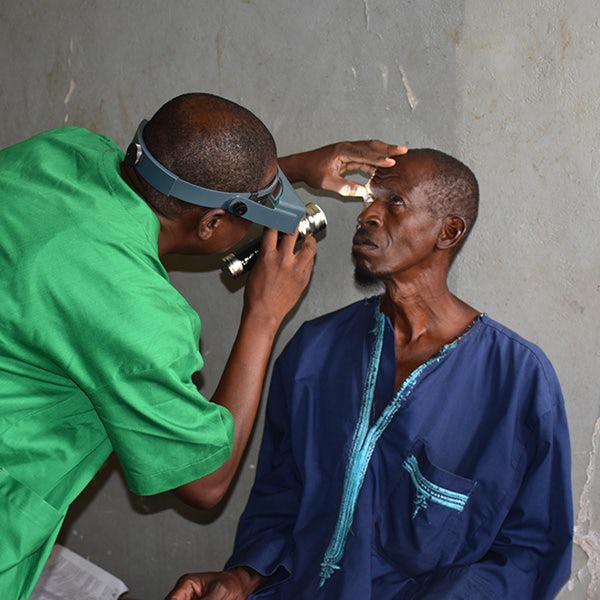
SoftwareOne klantreferentie
Secure user access to O365 tools helps Helen Keller Intl collaborate to tackle global health issues

Azure Active Directory Identity Management and Single Sign-On for reliable communication capabilities across continents
As a global non-profit organization, Helen Keller International is “dedicated to eliminating preventable vision loss, malnutrition, and diseases of poverty.” Modern, lean, and scalable Information Technology is critical to its vital purpose, from field research that makes a difference in people’s lives, to mobile collection that captures data in remote places to enable health interventions. Helen Keller International wanted to increase better use of Microsoft 365 to manage its Future Workplace environment while reducing management time and costs. Replacing its Active Directory File Servers would enable more straight-forward user authentication while reducing deployment and maintenance requirements.
SoftwareOne helped Helen Keller International deploy an Azure Identity Management strategy to more easily manage user access to its future workplace environment. Taking advantage of Microsoft 365, the plan implements a fully cloud-based Active Directory Single Sign-On (ADSS) identity solution and expands the use of additional features such as Power BI. Also, Microsoft Teams has become an essential means of communication across the non-profit’s disparate locations. Fast and reliable access has enabled Helen Keller International's staff to maintain the uninterrupted performance of life-changing health solutions, an even more significant challenge with the advance of COVID-19.

- Klant
- Helen Keller International
- Branche
- Non-profit
- Services
- Development of an Azure Identity Management Strategy and implementation of Azure Active Directory Single Sign-On (ADSS) for user authentication
- Land
- United States
Our small IT staff, dealing with single sign-on, needed the help of experts. The SoftwareOne consultants were quite knowledgeable. They'd been through the process several times and inspired us to be both calm and confident.
Ric Plaisance
Vice President Information and Operations Systems, Helen Keller International
About the client
Helen Keller envisioned a world without barriers to human potential. Guided by her fierce optimism. Helen Keller International delivers life-changing health care to vulnerable families in places where the need is great, but access is limited. Proven, science-based programs empower people to create opportunities in their own lives.
The organization was co-founded by Helen Keller in 1915 to provide assistance to soldiers blinded during World War I. Today, expanded programs prioritize preventing and treating vision loss and blindness – as well as addressing major global health problems such as malnutrition and neglected diseases that threaten sight, productivity, and well-being.
Helen Keller currently has more than 120 programs in 21 countries around the world. In Africa, Asia, Europe, and the U.S., Helen Keller builds the capacity of local government, non-profit, and private sector systems and infrastructure. It promotes the development of sustained, large scale programs that deliver effective solutions to preventable vision loss and malnutrition.
The challenge
Operating an organization such as Helen Keller International comes with complex challenges. Its clearly articulated mission is to be “a global health organization dedicated to eliminating preventable vision loss, malnutrition, and diseases of poverty.” The complexity comes in how that gets accomplished in 21 countries across four continents. That’s why future-proof, reliable, and efficient information technology is critical to Helen Keller’s vital purpose.
As with any broad-based organization, IT systems provide Helen Keller with support for normal business activities. However, information systems are also critical to field research about health conditions and interventions that make a difference in people’s lives. The mobile collection captures data in remote places and moves it to central databases for the reporting, research, and analysis that leads to health interventions. Other types of IT systems are used for eye scans in remote areas of Asia, collecting data for transmission to regional hospitals for review and treatment recommendations.
This is why IT takes on a broader dimension of importance in research and treatment. For example, mobile IT is key to projects such as remote eye scan transmissions.
We pride ourselves on doing evidence-based work in the field, combating vision loss, and protecting health,
– said Ric Plaisance, Vice President Information and Operations Systems.
That's the true value of Helen Keller International.
The organization faced two IT challenges. It needed to decide on renewal or upgrade of its expiring license for Active Directory Federation Services (ADFS) servers. The expense and operational requirements of the ADFS on-premises infrastructure had been demanding. So, on the advice of SoftwareOne, the team opted for a cloud-based alternative. Microsoft’s Azure cloud offered an attractive user authentication solution, and a better fit for operational business requirements. However, the project had to be accomplished in a short timeline, and stay within a tight budget.

The solution
Helen Keller International had four Active Directory Servers in use, two physical servers located in the New York City offices, and two in the Azure cloud. These provided the authentication security needed to keep research data flowing and maintain application access and secure communications with program staff globally.
With the license renewal deadline fast approaching,
we needed subject matter experts to help us understand our options. Also, because license renewal and upgrade are quite complex, we needed outside expertise to do it correctly,– said Lesley Edinboro, Global Information Systems Manager.
Together with SoftwareOne, Helen Keller developed an Azure Identity Management strategy to better manage user authentication costs, deployment, and maintenance requirements for its future workplace environment. Using Microsoft 365, the plan also takes advantage of additional features such as Microsoft Power BI for research analytics, and Microsoft Power Automate to improve productivity using automated workflows. Most importantly, taking advantage of existing Microsoft 365 licensing, the cloud identity solution Azure AD Seamless Single Sign-On replaced the four ADFS servers for identity management. This allows users to enjoy a fast, simple, and reliable Single Sign-On experience to access Microsoft 365 cloud applications, as well as timesheet, security, and other business applications.
In the face of COVID-19, Microsoft Teams has increased in importance as an essential means of communication and collaboration across disparate locations, remote sites, and required work-from-home situations.
Fast, easy and reliable access is fundamental, especially in difficult times like the COVID-19 pandemic. Using M365 capabilities, organizations like Helen Keller International can continue their vital work for people in need without compromising performance or security.
The result
- In support of Helen Keller Intl's research and life-changing healthcare mission, SoftwareOne helped the non-profit develop an Azure Identity Management strategy to better manage its future workplace environment.
- The new strategy used M365 capabilities to implement Azure AD Seamless Single Sign-On. This established a fully-cloud-based active directory identity solution for fast, easy, and reliable M365 user authentication for cloud applications including timesheet, security, and more.
- The new cloud-native authentication solution replaces four ADFS servers, reducing complexity, management time, deployment, and maintenance costs. It provides time relief for the small IT team to increase focus on the most critical tasks and projects.
- Building on Office 365, an expanded strategy takes advantage of additional features such as Microsoft Power BI for research analytics, and Microsoft Power Automate to improve its productivity by workflow automation.
- In the face of COVID-19, Microsoft Teams has become an essential means of communication and collaboration, helping to maintain fundamental business operations, vital research, and essential healthcare activities across disparate global locations.
- The optimized identity and access management at Helen Keller strengthens central elements supporting research and providing treatments, including mobile IT for remote data collection and transmission to combat vision loss and sustain critical healthcare programs.
Meer klantervaringen

Neem contact op met onze experts
Deel je uitdaging met SoftwareOne. Wij helpen je graag verder.
Neem contact op met onze experts
Deel je uitdaging met SoftwareOne. Wij helpen je graag verder.




